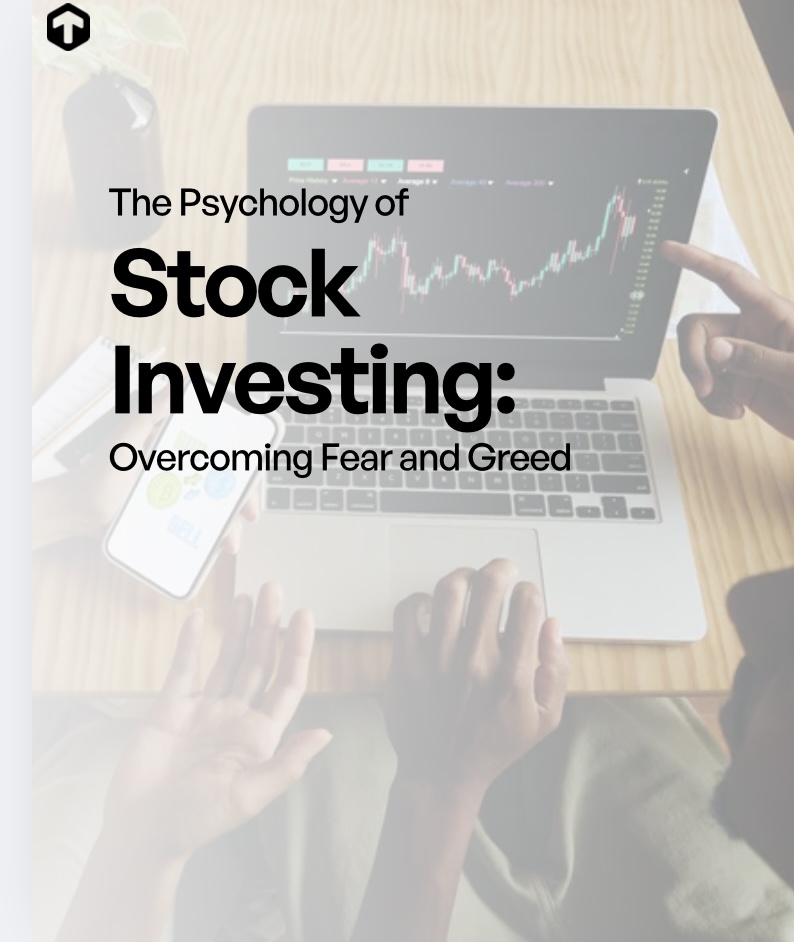As an investor, fear, and greed are two of the most common psychological forces you’ll face and they can make or break your financial success.
I know what you might be thinking: “How can I possibly overcome these natural emotions?” The truth is, you’re not expected to eliminate them entirely. Instead, the goal is to understand their impact, recognize their triggers, and learn how to manage them effectively.
In this blog, I’ll guide you through the psychology of stock investing and show you practical ways to overcome the fear of losses and the greed for excessive gains.
Why Fear and Greed are Powerful Forces in Investing
Stock investing isn’t just a numbers game. It’s a deeply emotional experience. Fear and greed, two primary emotions, often dictate how investors behave. Fear can keep you paralyzed, preventing you from taking advantage of great opportunities. On the other hand, greed can push you into risky decisions, chasing unrealistic returns.
Fear (The Silent Portfolio Killer)
Fear stems from uncertainty. What if the market crashes? What if you lose all your hard-earned money? These questions loop in your mind, making it hard to take action. Fear might cause you to sell stocks prematurely during a downturn, locking in losses instead of waiting for the market to recover. Worse, it might stop you from investing altogether, leaving your money stagnant in savings accounts while inflation erodes its value.
Greed
Greed, on the other hand, feeds on the desire for more. It whispers promises of instant wealth and tempts you to chase high-risk investments without doing thorough research.
When greed takes over, you might hold onto winning stocks for too long, ignoring warning signs of an impending decline. You might also fall prey to the “fear of missing out” (FOMO), jumping into overhyped stocks at their peak prices.
These emotions can derail even the most experienced investors if left unchecked. So, how do you navigate these challenges? Let’s break it down.
Understanding the Role of Psychology in Stock Investing
Before we dive into strategies, it’s important to understand why psychology plays such a critical role in investing. Investing isn’t just about facts and figures—it’s about decision-making under uncertainty. And as humans, our brains are wired to respond emotionally when faced with uncertainty.
Behavioral Biases That Influence Investors
Several psychological biases amplify fear and greed. Here are a few to watch out for:
- Loss Aversion: People tend to feel the pain of losses more intensely than the joy of gains. This can lead to overly cautious decisions.
- Confirmation Bias: Investors often seek information that supports their existing beliefs, ignoring data that contradicts them.
- Overconfidence: This bias makes you believe you’re smarter than the market, leading to impulsive and risky decisions.
- Herd Mentality: When everyone is buying a stock, it’s tempting to join the crowd, even if the fundamentals don’t support the hype.
- Recognizing these biases is the first step toward overcoming them. Now, let’s explore practical strategies to master your emotions.
How to Overcome Fear and Greed in Stock Investing
1. Develop a Long-Term Mindset
One of the best ways to manage fear and greed is to shift your focus from short-term market fluctuations to long-term goals. Ask yourself: what’s the purpose of your investment? Are you saving for retirement, a child’s education, or financial freedom? Keeping your goals in mind can help you stay the course, even when the market is volatile.
2. Create a Solid Investment Plan
Having a clear plan can act as your anchor during turbulent times. Decide on your asset allocation, risk tolerance, and investment timeline in advance. Stick to your plan, even when emotions tempt you to stray. For example, if your plan is to invest in index funds for 20 years, don’t panic and sell during a market dip. Instead, view it as an opportunity to buy more shares at a discount.
3. Practice Dollar-Cost Averaging
Dollar-cost averaging involves investing a fixed amount of money at regular intervals, regardless of market conditions. This strategy helps you avoid the temptation to time the market—a behavior often driven by fear or greed. By consistently investing, you reduce the impact of volatility and build discipline.
4. Limit Exposure to Market Noise
Let’s be real: the financial news cycle thrives on drama. Headlines about market crashes or booming stocks are designed to grab your attention. But consuming too much market news can amplify your emotions and lead to hasty decisions. Limit your exposure to sensational headlines and focus on reliable, data-driven sources.
5. Diversify Your Portfolio
Diversification is a proven strategy to reduce risk and manage emotions. By spreading your investments across different asset classes, sectors, and geographic regions, you lower the impact of any single investment’s performance on your overall portfolio. This balance can help you feel more secure and less reactive.
6. Set Realistic Expectations
Investing isn’t a get-rich-quick scheme. Unrealistic expectations can fuel greed and disappointment. Understand that wealth-building through investing takes time. A 7-10% annual return might not sound glamorous, but it’s realistic and sustainable.
7. Learn to Pause and Reflect
When emotions run high, take a step back before making any decisions. Ask yourself: is this fear or greed talking? Journaling your thoughts or discussing them with a trusted financial advisor can provide clarity and prevent impulsive actions.
Why Emotional Mastery Matters
Overcoming fear and greed isn’t just about making better investment decisions. It’s about achieving financial peace of mind. When you master your emotions, you’ll feel more confident and in control of your financial future. Plus, you’ll be less likely to make costly mistakes that derail your goals.

Conclusion
The psychology of stock investing is a fascinating yet challenging aspect of building wealth. Fear and greed are powerful emotions, but they don’t have to control your decisions. By developing self-awareness, adopting sound strategies, and focusing on your long-term goals, you can overcome these emotional hurdles.
Remember, investing is a journey, not a sprint. The market will have its ups and downs, but your ability to stay calm and rational will make all the difference. So, the next time you feel fear creeping in or greed urging you to chase unrealistic gains, take a deep breath and remind yourself: you’re in this for the long haul. You’ve got this!



